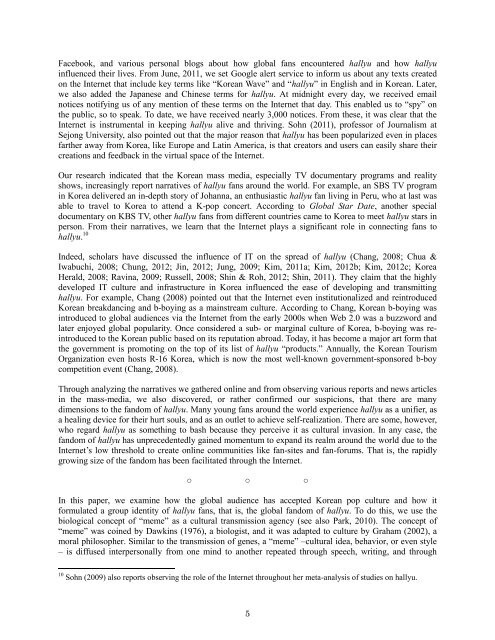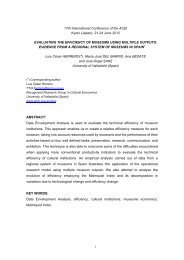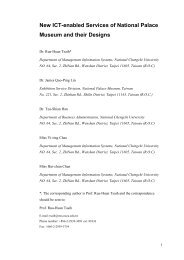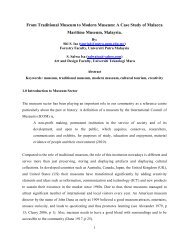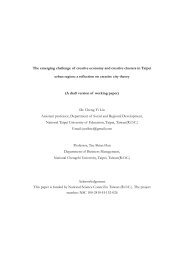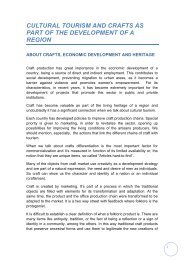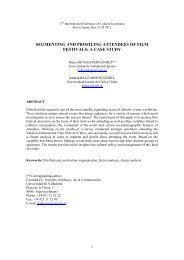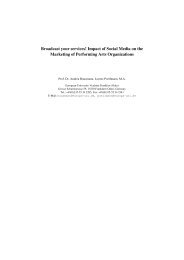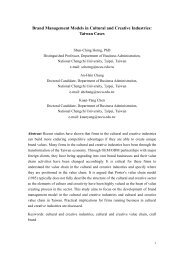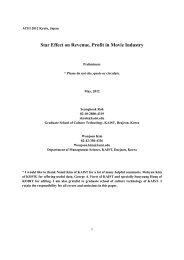The Korean Wave: Cultivating a Global Fandom by Shin-Eui Park ...
The Korean Wave: Cultivating a Global Fandom by Shin-Eui Park ...
The Korean Wave: Cultivating a Global Fandom by Shin-Eui Park ...
You also want an ePaper? Increase the reach of your titles
YUMPU automatically turns print PDFs into web optimized ePapers that Google loves.
Facebook, and various personal blogs about how global fans encountered hallyu and how hallyu<br />
influenced their lives. From June, 2011, we set Google alert service to inform us about any texts created<br />
on the Internet that include key terms like “<strong>Korean</strong> <strong>Wave</strong>” and “hallyu” in English and in <strong>Korean</strong>. Later,<br />
we also added the Japanese and Chinese terms for hallyu. At midnight every day, we received email<br />
notices notifying us of any mention of these terms on the Internet that day. This enabled us to “spy” on<br />
the public, so to speak. To date, we have received nearly 3,000 notices. From these, it was clear that the<br />
Internet is instrumental in keeping hallyu alive and thriving. Sohn (2011), professor of Journalism at<br />
Sejong University, also pointed out that the major reason that hallyu has been popularized even in places<br />
farther away from Korea, like Europe and Latin America, is that creators and users can easily share their<br />
creations and feedback in the virtual space of the Internet.<br />
Our research indicated that the <strong>Korean</strong> mass media, especially TV documentary programs and reality<br />
shows, increasingly report narratives of hallyu fans around the world. For example, an SBS TV program<br />
in Korea delivered an in-depth story of Johanna, an enthusiastic hallyu fan living in Peru, who at last was<br />
able to travel to Korea to attend a K-pop concert. According to <strong>Global</strong> Star Date, another special<br />
documentary on KBS TV, other hallyu fans from different countries came to Korea to meet hallyu stars in<br />
person. From their narratives, we learn that the Internet plays a significant role in connecting fans to<br />
hallyu. 10<br />
Indeed, scholars have discussed the influence of IT on the spread of hallyu (Chang, 2008; Chua &<br />
Iwabuchi, 2008; Chung, 2012; Jin, 2012; Jung, 2009; Kim, 2011a; Kim, 2012b; Kim, 2012c; Korea<br />
Herald, 2008; Ravina, 2009; Russell, 2008; <strong>Shin</strong> & Roh, 2012; <strong>Shin</strong>, 2011). <strong>The</strong>y claim that the highly<br />
developed IT culture and infrastructure in Korea influenced the ease of developing and transmitting<br />
hallyu. For example, Chang (2008) pointed out that the Internet even institutionalized and reintroduced<br />
<strong>Korean</strong> breakdancing and b-boying as a mainstream culture. According to Chang, <strong>Korean</strong> b-boying was<br />
introduced to global audiences via the Internet from the early 2000s when Web 2.0 was a buzzword and<br />
later enjoyed global popularity. Once considered a sub- or marginal culture of Korea, b-boying was reintroduced<br />
to the <strong>Korean</strong> public based on its reputation abroad. Today, it has become a major art form that<br />
the government is promoting on the top of its list of hallyu “products.” Annually, the <strong>Korean</strong> Tourism<br />
Organization even hosts R-16 Korea, which is now the most well-known government-sponsored b-boy<br />
competition event (Chang, 2008).<br />
Through analyzing the narratives we gathered online and from observing various reports and news articles<br />
in the mass-media, we also discovered, or rather confirmed our suspicions, that there are many<br />
dimensions to the fandom of hallyu. Many young fans around the world experience hallyu as a unifier, as<br />
a healing device for their hurt souls, and as an outlet to achieve self-realization. <strong>The</strong>re are some, however,<br />
who regard hallyu as something to bash because they perceive it as cultural invasion. In any case, the<br />
fandom of hallyu has unprecedentedly gained momentum to expand its realm around the world due to the<br />
Internet’s low threshold to create online communities like fan-sites and fan-forums. That is, the rapidly<br />
growing size of the fandom has been facilitated through the Internet.<br />
○ ○ ○<br />
In this paper, we examine how the global audience has accepted <strong>Korean</strong> pop culture and how it<br />
formulated a group identity of hallyu fans, that is, the global fandom of hallyu. To do this, we use the<br />
biological concept of “meme” as a cultural transmission agency (see also <strong>Park</strong>, 2010). <strong>The</strong> concept of<br />
“meme” was coined <strong>by</strong> Dawkins (1976), a biologist, and it was adapted to culture <strong>by</strong> Graham (2002), a<br />
moral philosopher. Similar to the transmission of genes, a “meme” –cultural idea, behavior, or even style<br />
– is diffused interpersonally from one mind to another repeated through speech, writing, and through<br />
10 Sohn (2009) also reports observing the role of the Internet throughout her meta-analysis of studies on hallyu.<br />
5


